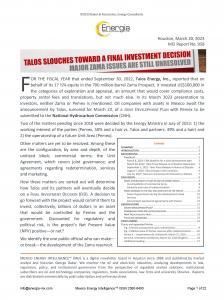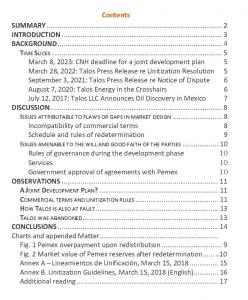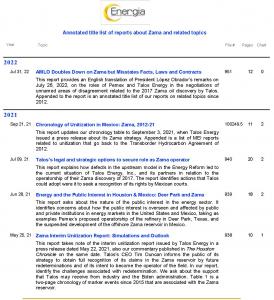Houston’s Talos Energy and Pemex struggle to find convergence over oil discovery
A report by Houston consultancy Baker & Associates analyzes challenges facing investors, regulators and ministers regarding the development of a giant reservoir
As described in MEI Report 958 of Mexico Energy Intelligence, an industry newsletter, Talos’s situation is complicated by a ruling of the Energy Ministry in 2021 that assigned Pemex as the operator with controlling ownership of the reservoir.
Even after four years of negotiations, there are still issues that must be resolved for the parties to reach a Final Investment Decision (FID) to move forward with joint development. Among these are operatorship, commercial terms, and redetermination.
It is in the development phase that 60% of the project’s total capital budget will spent. Pemex lacks experience in building out the necessary production and marketing infrastructure in a water depth of 165 meters. The efficient solution is for Talos and partners, Harbour Energy and Wintershall DEA, to assume responsibility for the initial development of the project.
For the project to proceed, a coherent commercial framework is needed. Where Talos has a production-sharing contract with cost recovery, Pemex’s license does not. Both licenses need to be renegotiated with the Finance Ministry, headed by Rogelio Ramírez de la O.
A third contentious topic is redetermination, which is the evaluation of well and production data at a point in the future to reevaluate relative ownership of the reservoir. Most observers believe that Pemex’s 50% share is excessive, but no one knows by how much because Pemex has not drilled a well of its own to back its claims.
These issues and others, such as the commercial terms for the use of Pemex’s existing pipeline and gas processing infrastructure, need to be worked out.
“No oil or gas will come from the Zama reservoir during this presidency, but everything else is uncertain,” says George Baker, the principal author of the report.
Appended to the report is an annotated title list of reports since 2012 on topics related to the Transboundary Hydrocarbon Agreement, Round 1.1, Block 7, Zama, unitization and redetermination.
George Baker
Baker & Associates, Energy Consultants
+1 832-434-3928
email us here
Visit us on social media:
Twitter
Legal Disclaimer:
EIN Presswire provides this news content "as is" without warranty of any kind. We do not accept any responsibility or liability for the accuracy, content, images, videos, licenses, completeness, legality, or reliability of the information contained in this article. If you have any complaints or copyright issues related to this article, kindly contact the author above.



